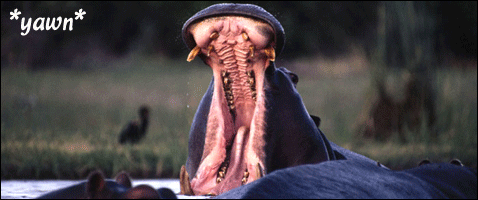Scientifics
Catch One If You Can – The Yawn Theory
Rosanna Gullveig
Have you ever wondered why you tend to yawn for no apparent reason, shortly after seeing someone else yawn? You’ve probably heard it said many times, ‘yawning is contagious,' but the question remains, WHY? I must warn you though, before you continue reading, there’s a strong probability that you’ll yawn at least once while reading this article. In fact, you may have already yawned if you consider the fact that I’ve already yawned twice in the time it took me to write the previous sentences! So I just want to be clear, I’m not trying to bore you, it’s just that reading about yawning will make you yawn, as will seeing or hearing someone else yawn. So, what’s behind this mysterious yawning epidemic?
What’s a yawn?
Before I delve into the mysteries of why yawning is contagious, it’s probably a good idea to clarify what a yawn actually is. A yawn is an involuntary action (meaning you have no control over it), in which you open your mouth wide and breathe in deeply. Yawning is most often associated with tiredness, boredom, over-work or a lack of stimulation. Pretty much everybody yawns, from little infants to the elderly. Even animals yawn, from your dog to hippos, and even some reptiles and birds.

Why do we yawn?
Ok, so this is the part we’re really interested in, and I hope you’re not all yawning away already! *EG* There is actually no carved in stone, all scientists agree, reason for which we yawn. We do however have a few very good hypotheses on the subject.
• We yawn because our brain needs more oxygen. This theory suggests that when our brain lacks oxygen, or when there is too much carbon dioxide in our blood (the gas that we produce and exhale), we yawn (which is essentially a huge breath of fresh air) in order to exchange these gases. The problem with this hypothesis is that, if this was the case, don’t you think that we would yawn when we exercise, since we require more oxygen at that time?
• We yawn because we’re tired or bored. This theory suggests that yawning is due to a lack of stimulation or activity, or due to drowsiness. Research has found that when we’re tired, our body releases special chemical messages to our brain and that these messages might induce yawning. The problem with this theory, is that it doesn’t explain why world-class athletes tend to yawn right before an important race or event. You’d think that being all pumped up, they wouldn’t be tired and certainly wouldn’t yawn.
• We yawn because it stabilizes the pressure in our ears. Because the action of yawning includes such a big gulp of air, this theory suggests that yawning is some kind of evolutionary thing we do in order to respond to pressure changes in our environment.
These are just 3 of the most common theories regarding why we yawn. In reality, we really don’t know why we do it, just that we do!
Why is yawning contagious?
So now, our important question, why is yawning contagious? Yawning is described by most scientists, as a type of reflex. You don’t really control it, it just kind of happens. Think about it, you’ve probably tried not to yawn before, and regardless of your many efforts, found yourself yawning anyway. This is because yawning is a ‘sympathetic’ response, which means that your body will unconsciously imitate the action it sees/hears. Our brains have neurons (special brain cells that control pretty much all brain activity), called ‘mirror neurons’ which basically make your body imitate a stimulus it receives. This means that if you see someone yawn, your body’s natural reaction will be to imitate that action.
So WHY do we do it? That’s a good question, and most people agree that it has something to do with evolution. Yawning could have been a way for species to coordinate their actions. Maybe yawning was a method of communication between tribe members to inform others of their alertness. Also, since yawning has been found to cool the brain, it might have been a way to increase the alertness and vigilance of individuals or groups, thus allowing them to better protect their homes. The fact that we yawn after seeing someone else yawn (and sometimes you yawn just thinking about yawning), is thus due to a vestigial (evolutionary left-over) response in your brain. So, the next time you yawn, you can thank/blame evolution for leaving us with such a silly reflex mechanism!
One final little question remains. How many times did YOU yawn while reading this article?
References:
http://health.howstuffworks.com/question572.htm
http://faculty.washington.edu/chudler/yawning.htm